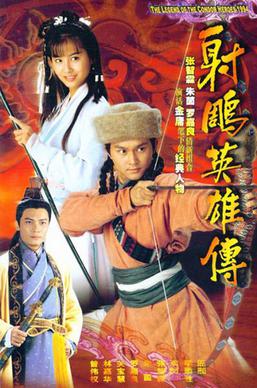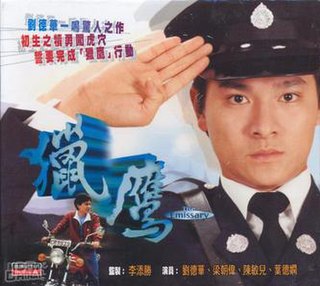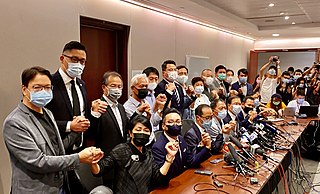
The Grand Bauhinia Medal is the highest award under the Hong Kong honours and awards system; it is to recognise the selected person's lifelong and highly significant contribution to the well-being of Hong Kong. The awardee is entitled to the postnominal letters GBM and the style The Honourable. The award was created in 1997 to replace the British honours system, following the transfer of sovereignty to the People's Republic of China and the establishment of the Hong Kong Special Administrative Region. The list was empty because no one awarded from 2003 to 2004. Bauhinia, Bauhinia blakeana, is the floral emblem of Hong Kong.
A list of awards given to members of the Hong Kong Civil Service:

The Legend of the Condor Heroes is a Hong Kong television series adapted from Louis Cha's novel of the same title. The series was first broadcast on TVB Jade in 1994.

The Legend of the Book and Sword is a Hong Kong television series adapted from Louis Cha's novel The Book and the Sword. The series was first aired on TVB in Hong Kong in 1987.

The Emissary (獵鷹) is a 1982 Hong Kong crime drama television series produced by TVB and starring Andy Lau in his first television leading role, shooting him to instant fame. Since then, Lau's acting career began to take on a broad road. The series' theme song, titled Being at a High Game (胸懷大志), was composed and arranged by Joseph Koo, with lyrics written by Wong Jim, and was sung by Willie Fung.

The Condor Heroes Return is a Hong Kong television series loosely based on the stories of two characters in Louis Cha's novel The Legend of the Condor Heroes. The series was released overseas in October 1993 before broadcasting on TVB Jade in Hong Kong in March 1994.

The Return of the Condor Heroes is a Hong Kong wuxia television series adapted from Louis Cha's novel of the same title, produced by TVB. It was first broadcast on TVB Jade from 31 October 1983 to 6 January 1984 in Hong Kong. A total of 50 episodes were produced. The serial was re-aired in 1988, 1990, 1997, 2013, and 2018 on TVB Jade.

Gods of Honour is a Hong Kong television series adapted from the 16th-century novel Fengshen Bang, a Chinese vernacular classic written by Xu Zhonglin and Lu Xixing. The series was first aired on TVB Jade in Hong Kong in 2001. It starred Benny Chan, Chin Kar-lok, Irene Wan, Michelle Ye, Dickson Lee, Yuen Wah, Kingdom Yuen and Winnie Yeung in the lead roles.

The Duke of Mount Deer is a Hong Kong television series adapted from Louis Cha's novel The Deer and the Cauldron. It was first aired on TVB in Hong Kong in 1998.

Rain in the Heart is a 1990 Hong Kong television serial drama produced by TVB and starring Roger Kwok, Dominic Lam, Kathy Chow and Gallen Lo.
The Hong Kong Special Administrative Region Basic Law Consultative Committee was an official body established in 1985 to canvass views in Hong Kong on the drafts of the Hong Kong Basic Law.
The election for the Hong Kong deputies to the 12th National People's Congress (NPC) was held on 19 December 2012. 36 Hong Kong deputies were elected by an electoral college composed of 1,621 members.
The election for the Hong Kong deputies to the 10th National People's Congress (NPC) was held on 3 December 2002. 36 Hong Kong deputies were elected by an electoral college.
The election for the Hong Kong deputies to the 9th National People's Congress (NPC) was held on 8 December 1997. 36 Hong Kong deputies were elected by an electoral college. It was the first ever election for the Hong Kong deputies to the NPC since the establishment of the Hong Kong Special Administrative Region on 1 July 1997.
The Hong Kong Legislative Council members' oath-taking controversy was a series of events surrounding the oaths of office of a dozen pro-democracy and localist members-elect of the Legislative Council of Hong Kong (LegCo) on 12 October 2016 which have resulted in the disqualification of six members, Sixtus "Baggio" Leung and Yau Wai-ching of Youngspiration, who were unseated by the court on 15 November 2016, and Leung Kwok-hung, Nathan Law, Yiu Chung-yim and Lau Siu-lai on 14 July 2017.
The election for the Hong Kong deputies to the 13th National People's Congress (NPC) was held on 19 December 2017. 36 Hong Kong deputies were elected by an electoral college composed of 1,989 members.

On 11 November 2020, 15 Hong Kong pro-democracy members of the Legislative Council announced their resignations in protest against the decision of the National People's Congress Standing Committee (NPCSC) which bars Legislative Council members from supporting Hong Kong independence, refusing to recognise Beijing's sovereignty over Hong Kong, seeking help from "foreign countries or foreign forces to interfere in the affairs of the region" or committing "other acts that endanger national security" that resulted in the disqualification of pro-democracy legislators Alvin Yeung, Dennis Kwok, Kwok Ka-ki and Kenneth Leung. In July 2020, the four had been barred from running in the subsequently postponed Legislative Council election originally scheduled for September 2020. The resignation en masse left the Legislative Council membership dwindled to 43 out of the total number of 70 seats, with virtually no opposition for the first time since the 1997 handover.
The election for the Hong Kong deputies to the 14th National People's Congress (NPC) will be held on 15 December 2022. 36 Hong Kong deputies were elected by an electoral college composed of 1,420 members.











